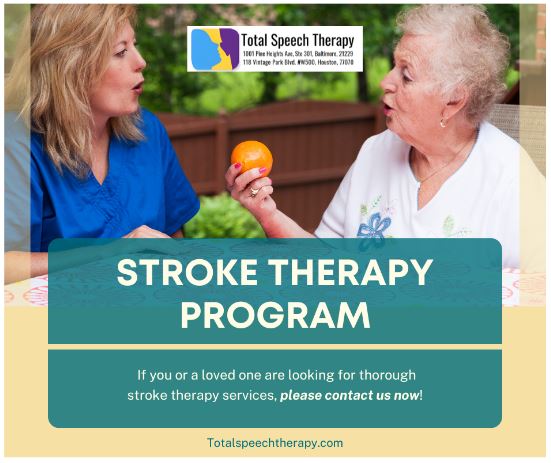Resilience, persistence, and hope are frequently present on the path to brain injury rehabilitation. Individuals recovering from a stroke have not only physical obstacles but also dramatic changes in their language and communication abilities. Because of the complicated relationship between language and specific parts of the brain, the recovery process is a difficult and critical aspect of rehabilitation. This investigation delves into the transforming journey from setback to recovery, emphasizing the critical significance of good brain injury therapy.
The Immediate Impact: Overcoming Speech and Language Difficulties
A stroke, which is an abrupt interruption in blood circulation to the brain, can have long-term effects on an individual’s capacity to speak effectively. The complex ballet between language and speech, coordinated by specific brain regions, is disturbed, putting the survivor in a state of confusion. The engagement of speech-language therapists becomes critical in the recovery process within the first 24 hours after a stroke.
Speech-language pathologists are essential in analyzing the immediate aftermath of a stroke. They keep a close eye on the patient while evaluating their muscular strength and coordination, which are crucial abilities that a stroke frequently damages. This first evaluation serves as the foundation for defining the safest and most successful nutritional and general well-being measures for the patient.
Speech Therapy in Action: Rebuilding the Verbal Framework
One of the most prevalent post-stroke issues is difficulty forming spoken sounds. The complex mechanics of articulation may be jeopardized, resulting in speech issues that impede effective communication. Speech therapists methodically create rehabilitation strategies to address these issues in response.
The process of rebuilding the verbal framework begins with the development of a thorough speech therapy plan. This includes workouts and strategies designed to improve muscular control and articulation. Individuals gradually regain control of their speech apparatus through a series of tailored therapies. It is a process that necessitates perseverance, patience, and the constant support of experienced therapists.
Language Therapy’s Critical Role in Rediscovering Language
Beyond the complexities of speech, stroke survivors frequently face difficulties with language formulation. Remembering how to put words and phrases together, as well as how to form cohesive sentences, are abilities that may need to be relearned. In this part of recovery, language therapy becomes a light of hope.
Verbal therapists work directly with patients, using exercises and procedures to help patients regain their verbal abilities. The idea is to delve into the deeper complexities of verbal communication rather than only address the surface-level difficulties. Individuals who participate in language therapy begin on a voyage of rediscovery, stitching together the shards of their linguistic abilities and weaving them into a cohesive tapestry.
The Integration Effect in Speech and Language Therapy
In many circumstances, combining speech and language treatment is the most successful way. This comprehensive technique recognizes the interdependence of speech and language functions and tailors therapies to address them simultaneously. The interaction of different therapy modalities results in a holistic rehabilitation strategy that enhances healing potential.
Speech and language therapy work together to reconnect people not only with their capacity to speak correctly but also with the complexities of language. It’s a process that goes beyond the physical parts of recovery, generating a profound sense of reconnection with oneself, one’s family, and one’s friends.
The Role of Total Speech Therapy in Brain Injury Rehabilitation
As someone who has witnessed the challenges of brain injury rehabilitation firsthand, Total Speech Therapy has been a guiding light amid the trials of recovery. This dedicated organization specializes in navigating the intricate landscape of stroke rehabilitation, placing a strong emphasis on quality and a patient-centered approach. Their involvement in the healing process right from the onset of stroke treatment showcases a steadfast commitment to facilitating comprehensive rehabilitation.
Total Speech Therapy’s expertise shines brightly in the crucial assessment of muscle strength and coordination, particularly vital for functions like chewing and swallowing post-stroke. The nuanced and sophisticated methods they employ ensure that each individual receives a personalized rehabilitation plan tailored to address their unique challenges, fostering optimal recovery.
In the realm of speech therapy, Total Speech Therapy stands out for its ability to go beyond surface-level issues. Their skilled therapists are adept at guiding clients through the intricate complexities of articulation, supporting them in regaining control over their speech processes. Through a meticulously crafted journey of exercises and treatments, patients experience a remarkable improvement in their speech abilities.
A significant component of Total Speech Therapy’s comprehensive approach lies in language therapy. This plays a pivotal role in helping individuals relearn language skills, serving as a vehicle for rediscovery. From constructing sentences to expressing complex thoughts, language therapy becomes an empowering tool, assisting individuals in rebuilding their verbal abilities.
In essence, individuals’ unwavering efforts, with the support of knowledgeable therapists and specialized organizations like Total Speech Therapy, mark the journey from setback to comeback in brain injury rehabilitation. The integration of speech and language therapy, coupled with a dedication to personalized care, paves the way for a spectacular resurgence. Total Speech Therapy exemplifies the transformative power of comprehensive rehabilitation, guiding individuals through the complex route of recovery and lighting the way forward.







Leave a Reply